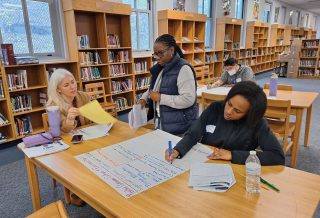FOCUS
Momentum for math
By Learning Forward
Categories: College- and career-ready standards, Learning designs, Online learning, TechnologyJune 2020
Vol. 41, No. 3
Read the remaining content with membership access. Join or log in below to continue.
Sed ut perspiciatis unde omnis iste natus error sit voluptatem accusantium doloremque laudantium, totam rem aperiam, eaque ipsa quae ab illo inventore veritatis et quasi architecto beatae vitae dicta sunt explicabo. Nemo enim ipsam voluptatem quia voluptas sit aspernatur aut odit aut fugit, sed quia consequuntur magni dolores eos qui ratione voluptatem sequi nesciunt. Neque porro quisquam est, qui dolorem ipsum quia dolor sit amet, consectetur, adipisci velit, sed quia non numquam eius modi tempora incidunt ut labore et dolore magnam aliquam quaerat voluptatem.
Partial list of student competencies for self-directed learning of mathematics
• I can use math vocabulary to explain my math thinking.
• I can ask questions if I don’t understand.
• I can ask for help if I need it.
• I can restate another student’s idea.
• I can use different strategies to solve problems.
• I can work independently.
• I can work collaboratively.
• I can represent my math thinking visually.
• I can use strategies to persevere with challenging problems.
• I can prove my answers make sense.
• I can learn from my mistakes.
• I can use feedback from others to improve my math work.
• I can set goals for my math learning and track my progress.
• I can reflect on my math learning.
• I can explain what I need to know and be able to do on assignments.
• I can use my math journal as a learning tool.
Jumping jacks math task
- How many jumping jacks can our whole class do in one minute? Make an estimate.
- Compare and discuss your estimates with your group.
- Talk about some ways you might gather data to help answer this question. Record your plan here.
- Your homework for tonight is to gather data to help solve this problem.
- Tomorrow you will share the data you collect with your group and prepare to present your investigation findings to the class.
- Be ready to talk about what this investigation has to do with measurement.
References
Hammond, Z. (2015). Culturally responsive teaching & the brain: Promoting authentic engagement and rigor among culturally and linguistically diverse students. Thousand Oaks, CA: Corwin.
Joyner, J.M. & Muri, M. (2011). INFORMative assessment: Formative assessment to improve math achievement. Sausalito, CA: Math Solutions.
Knight, J. (2019). Students on the margins. The Learning Professional, 40(6), 28-32.
National Council of Teachers of Mathematics. (2007). Five “key strategies” for effective formative assessment (NCTM Assessment Research Brief).
Learning Forward is the only professional association devoted exclusively to those who work in educator professional development. We help our members plan, implement, and measure high-quality professional learning so they can achieve success with their systems, schools, and students.
Categories: College- and career-ready standards, Learning designs, Online learning, Technology
Recent Issues
NAVIGATING NEW ROLES
April 2025
Whether you’re new to your role or supporting others who are new,...
LEARNING DESIGNS
February 2025
How we learn influences what we learn. This issue shares essential...
BUILDING BRIDGES
December 2024
Students benefit when educators bridge the continuum of professional...
CURRICULUM-BASED PROFESSIONAL LEARNING
October 2024
High-quality curriculum requires skilled educators to put it into...












